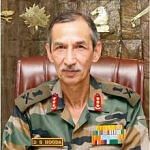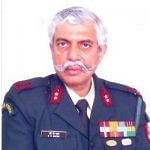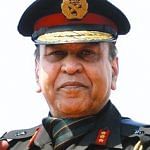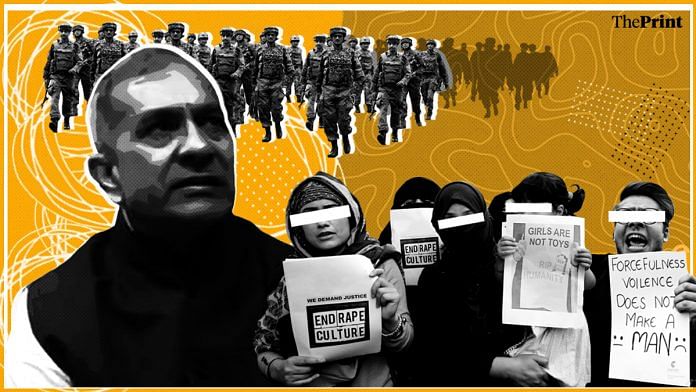During a debate on TV9 Bharatvarsh on the Kashmiri Pandit exodus, retired Major General S.P. Sinha suggested ‘rape in return for rape’ to avenge atrocities against Pandits. This comes at a time when the Indian Army Headquarters is reportedly considering a code of conduct for veterans.
ThePrint asks: Is it time for strict code of conduct for military veterans?
If media takes a principled stand, half the problem will be solved

Deependra Singh Hooda
Lieutenant General (Retd.), Indian Army
Retired Major General S.P. Sinha’s comments are reprehensible and must be condemned by everyone. It reflects his lack of understanding of the situation in Kashmir. It also damages the reputation of the Army.
However, I am not sure if a strict code of conduct will help because there are certain key questions that need to be first considered. Who will frame the code of conduct, what all will it cover, will it be seen as censorship of free speech?
Also, a code of conduct at this juncture would mean punishing all the veterans for the fault of one.
Veterans need to show a degree a self-discipline and restrict their comments to professional matters. They should not get into political debates, which inevitably result in a shouting competition.
The media too must share the blame as some channels deliberately call these veterans who shout, scream and take a biased stand on issues. Channels continue to call them because they want to telecast a high-pitched debate and increase their TRPs.
If media takes a principled stand, half the problem will be solved.
Code of conduct necessary in the wake of comments made by retired Army officer

Nawal Watali
Freelance writer and photographer, Kashmir
The unfortunate part in all of this is that people who the entire nation looks up to are making such atrocious comments.
Imagine the kind of discourse they are indulging in and then spreading it across the country through social and electronic media.
Such comments expose the lack of humanity on the part of the armed forces and how excesses against civilians are normalised, including mass rapes.
A code of conduct is, of course, necessary in the wake of such comments, which are driven by nothing but sheer hatred and contribute to sensationalism.
However, the question of how to go about implementing such a code of conduct remains. There is a thin line between free speech and hate speech. The latter is often baseless, non-factual, and a tool to play with people’s fragile emotions.
Retired Army officer S.P. Sinha’s hate speech plays into the mainstream Kashmir narrative following the dilution of Article 370.
If we really go by what the retired officer says, then the world would not even remain a liveable place. The masculine and authoritative tone is another problem.
The glorification of violence, war and Army are problematic and when a member of such a ‘revered’ institution passes such remarks, only god can save this country.
There are no restrictions on ‘hate speeches’ in JNU. Why single out military personnel?

G.D. Bakshi
Major General (Retd.), Indian Army
I emphatically disagree with Major General S.P. Sinha’s comment on revenge rape.
The debate around a proposed code of conduct has to be seen in the larger context of freedom of speech. A retired officer is by and large a free citizen. Retired service personnel are no longer subject to the Army Act and the legal tenability of such restrictions must be questioned. There are no restrictions on alleged hate speeches in JNU. Why should military personnel be singled out for such restrictions?
Constitution guarantees freedom of expression, but veterans won’t say things that hurt parent organisations in the first place.
Senior officers must adhere to an unwritten protocol. Unfortunately, there are some people who have fallen prey to propaganda. There is a need for some checks and balances, although not across the board.
On whether a code of conduct should be followed while appearing on media panels, I believe this is an interference with the right to free speech.
Often, ‘loose’, motivated and slanderous statements are made on TV channels, but in the larger interest of democracy, we must learn to live with it. An emphasis on self-regulation and loyalty to one’s country, however, is needed.
Having a specific code of conduct for veterans alone can be a double-edged sword

Ratna Viswanathan
Former civil servant, Ministry of Defence
There are several aspects to be considered here. Post-retirement, a veteran is no longer bound by the various armed forces acts. So technically, a veteran is a civilian bound by civil law. However, there is the issue of ‘good order and military discipline’, which is a way of life for the forces.
Their visibility is high since they retain their rank post-retirement. In the spirit of good order, they need to be circumspect and ensure that the reputation of the armed forces is not sullied by irresponsible statements/behaviour. However, freedom of expression is a fundamental right and cannot be taken away in a blanket manner.
Guiding principles (as opposed to a code of conduct) should cover all public servants post-retirement and not the armed forces alone. One way is to have a diverse public ethics committee that can review such cases, service agnostic, on a case-to-case basis and recommend action as appropriate (for example, public censure). If sentiments expressed violate existing law, then the relevant provisions of the IPC can be invoked to deal with the issue.
Having a specific code of conduct for veterans alone can be a double-edged sword and may lead to quelling of justified opinion on issues.
Military veterans must be open to constructive criticism

Syed Ata Hasnain
Lieutenant General (Retd.), Indian Army
The public and veterans alike are sufficiently worked up over the unethical remarks of a senior military veteran on Kashmir.
It is coincidental that this comes in the wake of the recent remarks by Army’s former Adjutant General, who said that Army headquarters is considering a veteran’s code of conduct.
Little do the serving officers in the armed forces realise that the veterans are actually an extension of their voice, but outside the strict boundaries of the Army Act and the Army Rules. These rules restrict officers from not just airing their grievances but also opinion on a whole range of professional issues.
A one-off misdemeanour on the part of a veteran has a negative effect, and senior veterans must call out such ‘loose missiles’ on every platform. However, to use this incident to add weight to a meaningless proposal a code of conduct for veterans must be strongly condemned.
The idea that the veteran community should be linked to the adherence to a code is legally unsustainable because military veterans are respected members of a free society. Most veterans conduct themselves responsibly in public; this is a result of leading a disciplined life in the services.
Constructive criticism is a right bestowed to every Indian by the Constitution and military veterans must be open to it as well.
Enforcing code of conduct goes against principles we are expected to respect in a democracy

D.P. Singh
Major (Retd.), Indian Army
A code of conduct cannot be implemented on any citizen of India. This is a democratic country where everyone is expected to follow the law of the land, and this in itself is taken as a strict code of conduct.
We are supposed to respect constitutional authority but a code of conduct goes against the very principles we are expected to respect.
Being a military veteran is no justification for being put under a code of conduct. However, a personal code of conduct is definitely expected from the veterans. One should not get carried away by emotions or biases, whether it is on gender, caste, creed or religion.
The Indian Army is respected for its brotherhood and secular character. We uphold the Indian flag and the Constitution.
By enforcing a code of conduct for veterans, we won’t be any different from Pakistan

Snehesh Alex Philip
Senior Associate Editor, ThePrint
While the remarks of Major General (retd) S.P. Sinha are a blot on the uniform that he once wore, they cannot be used as an excuse for bringing in a code of conduct for veterans.
A code of conduct, no matter how good the intention is, goes against India’s democratic principles.
While in service, soldiers are covered by their respective Service Acts. But once they retire, the Indian Penal Code (IPC) applies to them, besides civil norms and customs.
India won’t be any different from Pakistan if it enforces a code of conduct for veterans. In Pakistan, the powerful army decides which retired officers can appear on TV debates.
There is no doubt that veterans need to look within. Some of them are indeed sullying the image of the armed forces with their shouting, yelling and war-mongering during debates on news channels. Some of them troll, pass uncouth and communal remarks on social media. Many women journalists have fallen prey to selective targeting by some veterans on social media.
The veterans’ community must boycott such officers whose behaviour embarrasses the Indian military.
TV channels too should stop inviting such speakers to their shows. The standard of TV debates has nosedived, with many viewers now watching them for comic relief.
Also read: Army HQ wants code of conduct for retired personnel, veterans say ‘silly’ idea
By Kairvy Grewal, journalist at ThePrint




Fools rush in where angels fear to tread – code or no code of conduct.
Someone who has worn the uniform of the Indian Army, Jawan upwards, is a person we love respect, trust and admire. The bar must necessarily be set much higher for a General. Some, demonstrably, sadly, fail to clear it. Maj Gen G D Bakshi has been a trail blazer of sorts. If thirty years in service does not instil the soul of the Constitution into an officer’s value system, unclear what a Code of Conduct could hope to achieve.
Agree with your statement: If thirty years in service does not instil the soul of the Constitution into an officer’s value system, unclear what a Code of Conduct could hope to achieve.